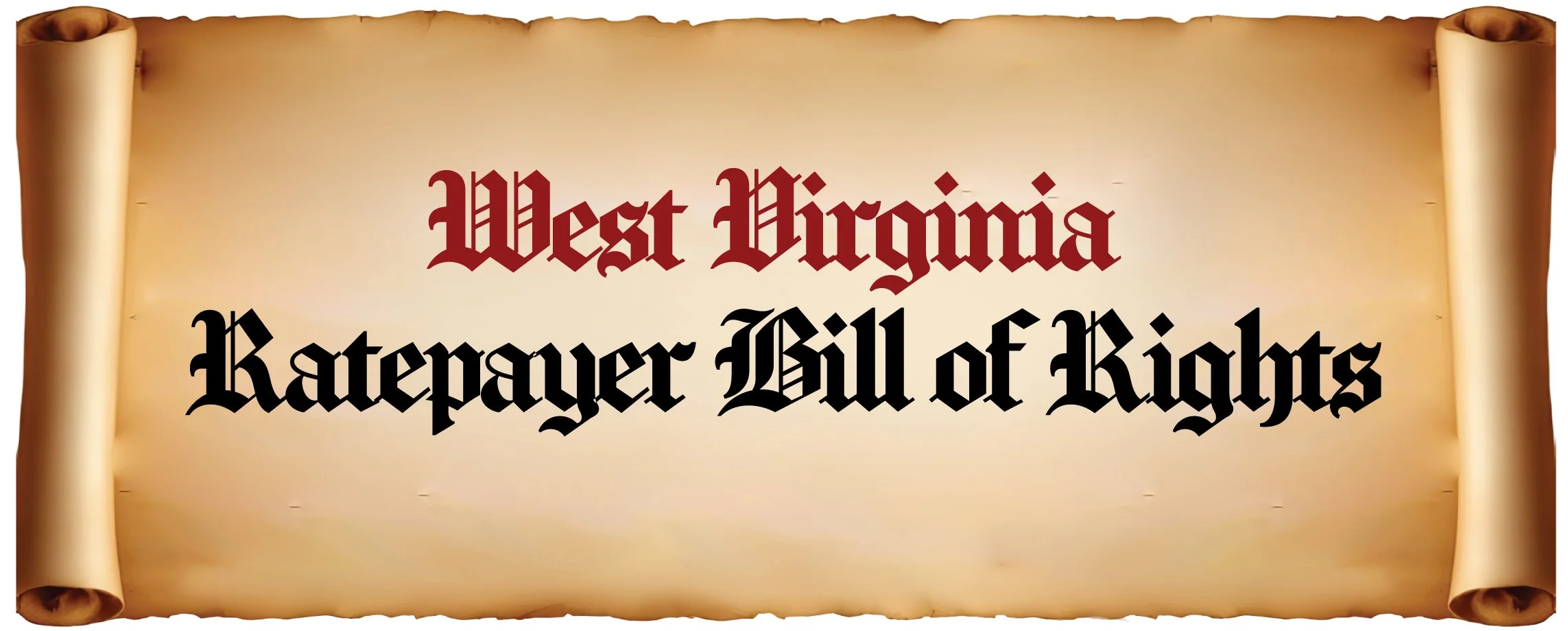Ratepayer Bill of Rights
Ratepayer Bill of rights
West Virginians deserve affordable, reliable, and fair utility services. This Ratepayer Bill of Rights states that all residents and businesses must be treated fairly and transparently by all electric, gas, and water utilities regulated by the West Virginia Public Service Commission (PSC).
1. Right to Fair and Reasonable Rates
Utility rates must be just, reasonable, and transparent, reflecting the actual cost of providing service without profiteering, putting ratepayer impacts as the top priority.
Any proposed rate increases must undergo public hearings in at least three different geographical locations within the affected service area to enable customers to voice concerns.
Utilities must provide discounted rates for those on low or fixed-incomes during the hottest and coldest months, extreme weather, medical emergencies, or states of emergency.
To increase ratepayers’ ability to plan and to decrease volatility, rate hikes must be limited and infrequent.
Large and unnecessary costs benefiting only a small number of customers must not be passed on to other ratepayers.
2. Right to Reliable and Safe Service
Utilities must provide consistent and safe service in accordance with national standards, responding promptly to outages and emergencies.
Utility companies must invest in grid resilience to reduce blackouts and prepare for severe weather, and must help their customers do the same.
Utilities must have a diverse portfolio of energy sources to insulate ratepayers from market volatility and interruptions in service.
3. Right to Transparent and Accurate Billing
Bills must be clear and itemized, showing energy usage, fees, and taxes with no hidden charges, and customers must have access to their historical energy bills.
Customers have the right to challenge incorrect bills, receive timely corrections, and access their usage data.
4. Right to Fair Disconnection Protections
Utilities must provide at least 30-days notice and at least three contact attempts before disconnecting service and offer a percentage of Income Payment Plan to struggling customers.
No household will be disconnected during the hottest and coldest months, extreme weather, medical emergencies or emergencies, or financial hardship.
5. Right to Energy Assistance and Efficiency
All customers shall have access to and be frequently informed about appropriate discounted utility rates and any changes in programs including:
Low-Income Energy Assistance Program (LIEAP)
Weatherization Assistance Programs
The Dollar Energy Fund
Utility-funded energy efficiency incentives
Flexible payment plans to avoid disconnections
Average monthly payment plans to avoid seasonal spikes in bills
6. Right to Renewable Energy Access
Customers have the right to generate their own energy, including solar power, and receive fair market credit through net metering.
Customers have a right to benefit from establishing or participating in community solar programs.
Customers have a right to choose where their energy comes from, including from neighbors, utilities, or local organizations.
7. Right to Fair Representation & Dispute Resolution
Utilities must resolve customer disputes promptly and fairly.
Customers have the right to file complaints with the WV Public Service Commission (PSC) if they are treated unfairly.
PSC Commissioners should come from a variety of backgrounds and reflect a history of advocating for the interests of different sets of ratepayers.
The Office of the Consumer Advocate should be established by statute as independent, with the sole duty to reduce the cost of utility bills for residential and small business ratepayers.
Customers have the right to reimbursement for costs incurred through rectifying intentional or grossly negligent utility practices.
8. Right to Public Participation and Engagement
Ratepayers have the right to attend and speak at PSC public hearings on rate changes, utility policies, and energy planning activities in an accessible manner.
Utilities must proactively let customers know about a rate increase and provide instructions on how to submit comments about it.
All public hearings must have an online option that is accessible and open to the public.
Cases that have a major impact on bills, employment, or the economy of any part of the state, including Integrated Resource Planning, must have public hearings in person within an hour’s drive of most customers.
All utilities must produce an annual report that tracks data on energy burdens in the state and make that information accessible to the Public Service Commission and to the Public.

